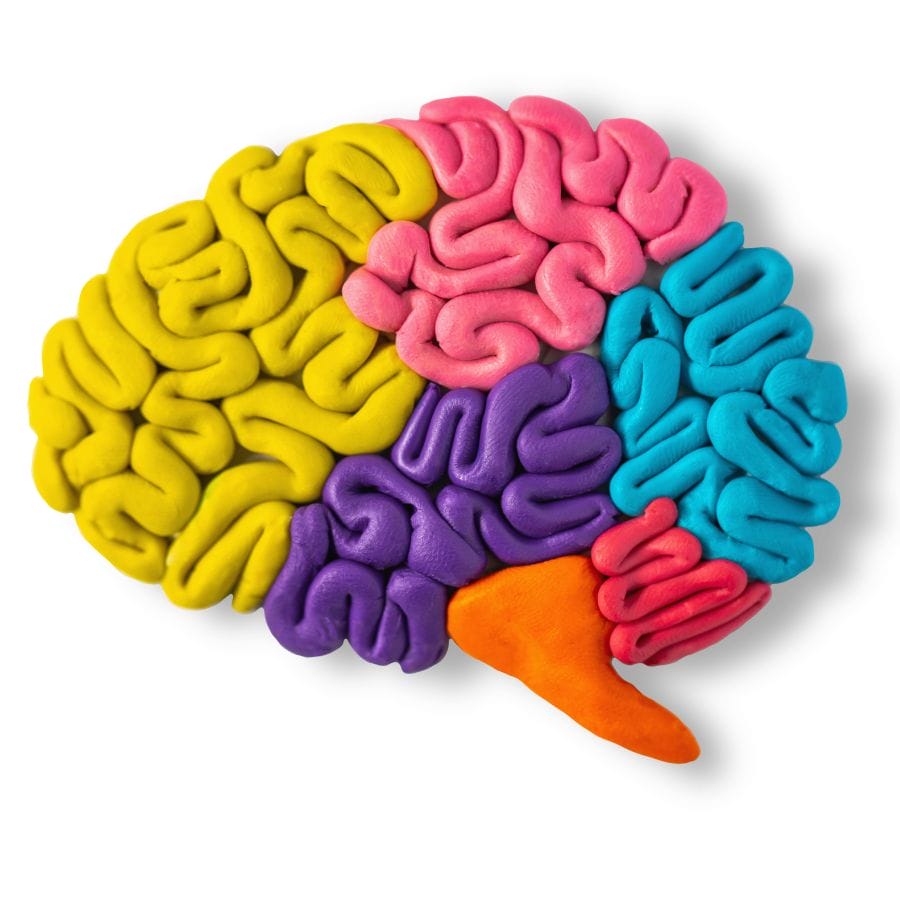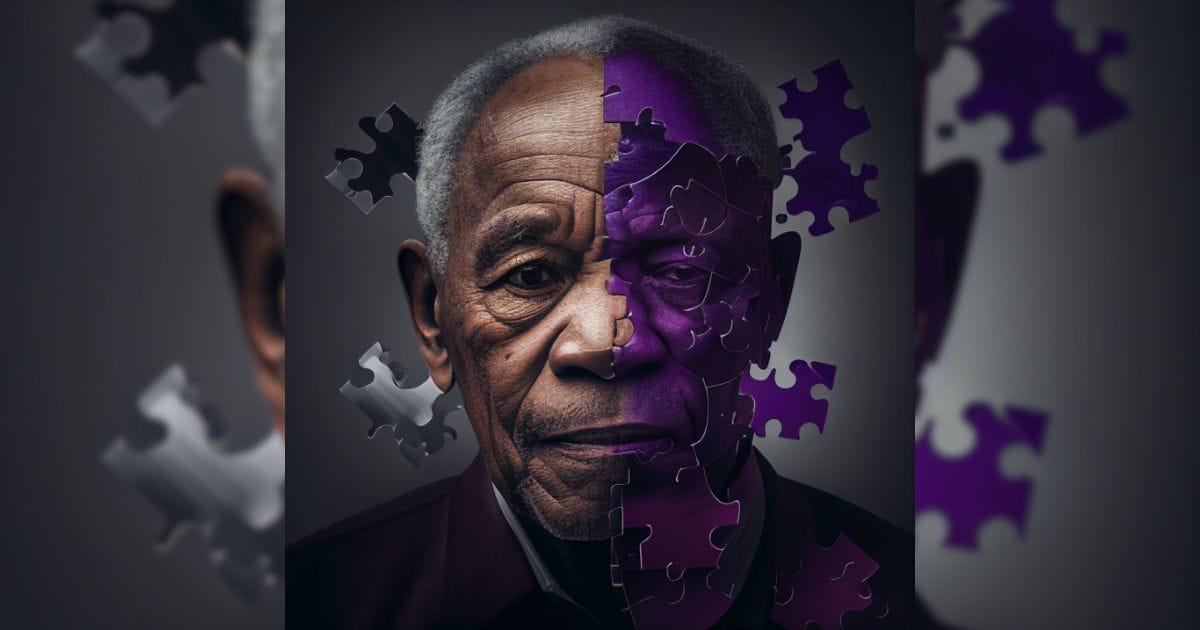Alzheimer’s Disease impacts 6.2 million Americans, most of whom are African American. Illustration by Crusader
It started with simple things, misplacing car keys, forgetting items on a grocery run, being unable to remember easy details, and confusing the time or dates. To all who know him, Jack Freeman appears to be a gracefully aging and healthy 77-year-old African American man. But as his forgetfulness and sporadic bouts of aggression and frustration increased, his physical facade and easygoing nature belied an unseen enemy lurking within him—the early onset of Alzheimer’s disease.
Mr. Freeman had been born and raised on his mother’s smoked collard greens and cornbread, on the city’s West Side, one of eight children. Though he was tall for his age, in grade school he got into a lot of fights with older boys where he earned a reputation for being tough and throwing a mean right hook.
As a teen, he took odds-and-ends jobs before scoring work at a local printer near the Little Italy neighborhood. The union shop provided young Freeman with both money and stability and a worldview seen through the eyes of a Black man. He wanted something bigger for himself. So, along with three of his brothers, Jack opened a recovery business.
In the late 1960s he settled down, took a wife, and had five children. After a bitter divorce, Jack Freeman would marry again, this time to a young widow with small children of her own, who also harbored the same big dreams for a bigger life. They settled on the far South Side and soon opened a thriving business together.
“Jack was always good with numbers,” Mrs. Freeman shared. “So I handled the payroll, the finances and stayed in the background and I did everything else out front, as they say. We built a good life together for our family. There’s always challenges when you work with your spouse because you’re basically around each other 24/7, but it worked.”
Now married for 40 years, the Freemans found their business struggling soon after the pandemic hit in March 2020. Revenue was down and maintaining qualified staff became increasingly difficult. The stress seemed to take a bigger toll on Jack, whom his wife says seemed more irritable and forgetful than normal. But the Freemans prevailed.
It wasn’t until Mr. Freeman became lost while on a routine bank run, that his wife began to suspect something was seriously wrong.
“He was gone for three hours when it should’ve taken less than half of that time by car, and he wasn’t answering his cell phone,” Jill Freeman told the Crusader. “I was worried out of my mind, but then he strolled in the house as if nothing had happened. Jack didn’t even realize he had been gone as long, he thought it had taken him only 30 minutes. He claimed he lost his cell phone, but I later found it in his jacket pocket.”
Mrs. Freeman said to dismiss her concerns, on his next bank trip he asked her to go with him. “Everything was okay, and we did the run just as we always had,” she said. “But on the way back he took several wrong turns before pulling over and hitting his fist on the steering wheel. When I asked him what was going on, and what was wrong, he admitted he couldn’t remember where we were going. I said, ‘Back to the office’ and he said, ‘But where is that?’”
Jack and Jill Freeman are not their real names. In exchange for candid details of their story the Crusader agreed to obscure their identities out of respect for the family’s health and privacy. Both are in their late 70s, operate a popular South Side business, and say they are in reasonably good physical health.
To them, dementia is like a puzzle or patchwork quilt where pieces or swaths of fabric become frayed, go missing, or no longer fit. One can only watch as their loved one slowly vanishes before them.

DEMENTIA DEFINED
Dementia is a broad category of brain disorders that cause a gradual and often irreversible decline in cognitive functions. It impacts memory, reasoning, planning, and communication, ultimately affecting an individual’s ability to perform everyday activities. Although it is commonly associated with aging, dementia is not a normal part of the aging process. According to the Alzheimer’s Association, Alzheimer’s disease accounts for 60-to-80 percent of dementia cases. Vascular dementia, following a stroke, is the second most common type.
The condition disproportionately affects certain populations; in the United States, older Black Americans are about twice as likely to have Alzheimer’s or other dementias as older white Americans. Studies such as the “African American Dementia Outreach Partnership” project aim to understand these disparities better.
Dementia has a profound effect on caregivers and families, both emotionally and economically. A 2020 study published in the journal “Health Affairs” found that the total lifetime cost of care for an individual with dementia was $357,297. For Black Americans, these costs can be especially burdensome due to existing social and economic disparities.
While there is currently no cure for dementia, early diagnosis, and intervention can significantly improve the quality of life for people with the condition. However, the condition is often underdiagnosed and underreported because symptoms manifest gradually, especially in minority communities.Source: “The Lifetime Economic Burden of Alzheimer’s Disease in the United States.” Health Affairs, 2020
Mrs. Freeman said though she suspected her husband had Alzheimer’s, he angrily rejected the notion and refused to see a doctor. “The forgetfulness, the longer than normal errands, and getting mad over simple little things were getting worse by the minute,” she told the Crusader. “Jack wasn’t himself anymore. It was like he wasn’t there. He’d ask me over and over and over about something that happened 30 years ago as if it had just happened. Sometimes he’d get up real quick thinking someone was breaking into the office. It was scary.”
Jill said his behavioral changes were gradually noticeable to extended family and friends, but as his wife of four decades his frequent outbursts, repeated questions, stubbornness, and insistence that nothing was wrong, was glaring. “To his siblings and friends they claimed that maybe Jack was just getting old,” she said, noting their words were of no comfort. “They didn’t know him like I did. I was around him all day, and I could see my husband slowly slipping away.”
After “dealing with it” for 20 months, Mrs. Freeman said she convinced her husband to see a doctor; he was diagnosed in 2021 with early-onset Alzheimer’s, which leads to a severe form of dementia.
“We both were shocked, and I was devastated. But this diagnosis answered so many questions. I wasn’t going crazy. I knew something was wrong with my husband. He wasn’t the same. I didn’t know this Jack anymore,” she said.
Two days after his diagnosis, Mrs. Freeman said her husband had forgotten all about it, argued that he hadn’t even been to the doctor’s office in 15 years, and “insisted I was making it all up so I could sneak off and marry a man (who had been dead since 1995),” she said.
The wife, a petite woman, said there were many times she feared her six-foot-four husband would harm her, himself, or others when he had episodes of paranoia and fear of someone breaking in.
“I did my research about this, and I knew that people with dementia can sometimes become hard to control, and Jack always saw himself as my protector,” Mrs. Freeman told the Crusader. “He has firearms I had to move to secure them elsewhere. I saw on the news about a man shooting his daughter dead because he thought she was an intruder. I felt I needed to be proactive to prevent any such incident happening with Jack.”
There were days when Mr. Freeman was his old self and others when he was a stranger, his wife explained. “Caring for him became another full-time job,” she said, “but this is my husband and I love him. Till death do us part. But this is hard mostly because they don’t look sick, so people don’t understand what you’re going through. They don’t understand. If he’s up pacing the floor at one in the morning, you’re up too, making sure he doesn’t wander out of the house.
“As a new mother you learn to toddler-proof your home,” she said. “As a wife of someone with dementia, I had to do the same thing. I put a GPS system on Jack’s car so if he got lost we’d know where he was. I had to learn how not to get upset when he kept repeating the same things. I’d have to go with him on errands; and, we still had a full-time business to run. We argued a lot more. He’d fly off the handle and an hour later act like it had never happened. I worried that one day he would not recognize me. There were a lot of days I was in the bathroom crying.”
An estimated 6.2 million Americans aged 65 and older are living with Alzheimer’s disease, according to the Alzheimer’s Association. This number is expected to nearly triple to 13.8 million by 2060, based on projections from the Centers for Disease Control and Prevention (CDC). In Illinois, 230,000 people have been diagnosed with the disease, according to the Illinois Department of Public Health (IDPH).
Neighboring Gary, Indiana, also grapples with this disparity; the Indiana State Department of Health reports a higher incidence rate of Alzheimer’s disease among Black residents.
IDPH also reported, “Simultaneously there is an increasing shortage of direct care providers in the aging, disability, and public health networks. In 2021, approximately 383,000 Illinois caregivers provided more than 486 billion hours of care to someone living with some form of dementia. That unpaid value of care is more than $8.8 billion.”
Named for Dr. Alois Alzheimer, who in 1906 noticed changes in the brain tissue of a woman who had died of an unusual mental illness, Alzheimer’s is a type of dementia that affects memory, thinking and behavior. Symptoms eventually grow severe enough to interfere with daily tasks and could lead to death. There are popular stories about sufferers going missing or forgetting to eat meals, taking medications, or even repeatedly consuming prescription pills, leading to fatal dosing and accidental deaths.
Alzheimer’s changes typically begin in the part of the brain that affects learning and the most common early symptom is difficulty remembering newly learned information. As the disease advances through the brain it leads to increasingly severe symptoms, including disorientation, mood, and behavior changes; deepening confusion about events, time, and place; unfounded suspicions about family, friends, and professional caregivers; more serious memory loss and behavior changes; and difficulty speaking, swallowing and walking.

UNDERSTANDING THE BRAIN
The human brain is the complex organ responsible for cognition, emotion, and regulating bodily functions. It is a complex organ that serves as the control center for the body, responsible for regulating physical and mental functions.
Consisting of approximately 86 billion neurons, the brain communicates via intricate networks of electrical and chemical signals. It is divided into several regions, each specialized for different functions.
The frontal lobe is vital for decision-making and problem-solving; the temporal lobe handles auditory information and memory; the parietal lobe is responsible for spatial awareness; and the occipital lobe processes visual data.
Neurons communicate through synapses, where neurotransmitters like dopamine and serotonin are released to transmit signals. This complex system allows for a broad range of cognitive abilities, from basic motor skills to advanced reasoning and emotional intelligence.
Brain function is influenced by a variety of factors, including genetics, environment, and lifestyle choices. Despite its resilience, the brain is vulnerable to diseases such as dementia, which can severely impair cognitive function over time.
On average, a person with Alzheimer’s lives four-to-eight years after diagnosis but can live as long as 20 years, depending on other factors. According to the Illinois chapter of the Alzheimer’s Association, the cost of caring for those with the disease in this state is expected to be $345 billion by the end of 2023.
It has no known cause and develops from multiple factors, such as genetics, lifestyle and environment. According to researchers, family history is not necessary for an individual to develop Alzheimer’s. However, research shows that those who have a parent or sibling with Alzheimer’s are more likely to develop the disease than those who do not have a first-degree relative with Alzheimer’s.
Dementia, often confused with Alzheimer’s, is a general term for a decline in mental ability severe enough to interfere with daily life, while Alzheimer’s is a specific disease. Alzheimer’s is the most common cause of dementia. Many different types of dementia exist, and many conditions cause it. Mixed dementia is a condition in which brain changes of more than one type of dementia occur simultaneously.
Alzheimer’s disease is the most common cause of dementia, accounting for 60 percent to 80 percent of dementia cases.
According to Dr. Reisa Sperling, a neurologist specializing in Alzheimer’s disease at Harvard Medical School, “Dementia robs us of connections to the people we care about the most and is often isolating and lonely, both for those living with the disease and their caregivers.”
It should come as no surprise that in the U.S., along with certain cancers, diabetes, heart disease, and homicide, Alzheimer’s disease disproportionately affects African Americans. Older Blacks are twice as likely to have Alzheimer’s or other dementias than their white counterparts.
Lionel Martin, communications manager at the Illinois Alzheimer’s Association, provided a few facts to the Crusader as part of the organization’s ongoing community education and outreach program. Early detection is key. To diagnose Alzheimer’s, physicians may use medical history, mental status tests, physical and neurological exams, diagnostic tests, and brain imaging.
Early detection also allows people the chance to prioritize their health: Some lifestyle changes, such as controlling blood pressure, stopping smoking, participating in exercise, and staying mentally and socially active, may help preserve cognitive function, researchers found.
The diagnosis allows a person to access additional treatment options. Although Alzheimer’s has no cure, there are currently two treatments available, Aduhelm, approved by the Food and Drug Administration (FDA) in 2021, and lecanemab, brand name Leqembi, approved in January 2023 for patients confirmed to be in early-stage Alzheimer’s disease; the latter drug has allegedly been shown to slow progression.
Early detection also provides patients an opportunity to participate in clinical trials: An early diagnosis makes individuals eligible for a wider variety of clinical trials, with advanced research and may provide medical benefits.
Relatives of dementia patients might also seek to join organizations and community programs designed to educate and support caregivers. The Southern Illinois University School of Medicine provides a series of fact sheets and other guided support for caregivers, including tips on home safety, diet and nutrition, exercise, and sleep. San Francisco-based Family Caregivers Alliance provides online support and consultation to people caring for older and ill adults. The “Caregiver’s Guide to Understanding Dementia Behaviors” offers specific recommendations.

THE SYMPTOMS: WHAT’S WRONG WITH POPS?
Older Black Americans are about twice as likely to develop Alzheimer’s or other dementias compared to older white Americans, highlighting the need for culturally tailored approaches to diagnosis and care.
According to Maria Carrillo, Chief Science Officer of the Alzheimer’s Association, “Early and accurate diagnosis could save up to $7.9 trillion in medical and care costs.”
Alzheimer’s disease manifests through a range of cognitive, behavioral, and psychological symptoms that progressively worsen over time. Here are some common symptoms:
Cognitive Symptoms
- Memory Loss: Forgetting important dates, asking the same questions repeatedly, and increasingly relying on memory aids.
- Difficulty with Problem-Solving: Trouble following plans, difficulty concentrating, and taking longer to perform familiar tasks.
- Disorientation: Losing track of time, dates, or even seasons; forgetting where they are or how they got there.
- Language Difficulties: Struggling to participate in conversations, repeating phrases, or forgetting words.
Behavioral Symptoms
- Mood Changes: Increased irritability, confusion, or depression.
- Withdrawal: Losing interest in social activities, hobbies, or work.
- Personality Changes: Becoming easily upset, suspicious, anxious, or fearful.
Psychological Symptoms
- Paranoia: Distrust in family members or caregivers.
- Hallucinations: Seeing or hearing things that aren’t there.
“Some of the greatest challenges of caring for a loved one with dementia are the personality and behavior changes that often occur. You can best meet these challenges by using creativity, flexibility, patience, and compassion. It also helps to not take things personally and maintain your sense of humor,” the guide states.
Jill Freeman says her husband’s diagnosis has not only changed his personality and how the family operates its business and other duties but has also put stress on their family. “After Jack was diagnosed, I started having difficulty with some of my in-laws,” he said. “They didn’t live with us and they didn’t interact with Jack that much, so when they saw him they didn’t think anything was wrong. He didn’t look ill, and he remembered them all by name. They thought I was exaggerating and being negative. Later they claimed I was abusive.”
Some of his relatives “thought it was cute” when he couldn’t remember someone’s name, Mrs. Freeman said, and chalked up most of his change in behavior as a part of aging. She believes her efforts to protect him appeared as controlling to outsiders.
“When I looked up one of his sisters had filed a petition with the court to remove me from Jack’s guardianship,” she said, through tears. “They had convinced me to let him visit them for a weekend and never brought him back home. I never imagined that my marital rights could be challenged because I took a vow with my husband and we both promised each other we’d always honor it, no matter who became sick or passed away first. I felt like I was trapped in a horror movie.
“I was under a lot of stress,” she said. “A lot of this was as confusing as Jack’s memories. I didn’t know what was to be gained by any of it.” Declining to speculate, Jill Freeman said, “All I wanted was stability and quality health care for Jack. If this was stressful to me, I can only imagine what he was going through emotionally and mentally, when one minute you’re lucid and the next you’re not.”
Mrs. Freeman told the Crusader that not long after her in-laws went to court to secure guardianship, Mr. Freeman unexpectedly returned to their business, ready to work, and happy to see her. Her sister-in-law explained, “He wanted to come home so we brought him back,” she said. “I think they realized how much work it was to care for Jack. I didn’t care, I was happy my husband was back, at least in person.”
This year, the Social Security Administration issued a warning saying people suffering from Alzheimer’s or dementia are at an especially high risk of becoming victims of fraud and financial abuse. The Elder Justice Coalition is comprised of individuals and organizations. It serves as a resource to Congress, the Administration, the media, and the general public to raise awareness of elder abuse, neglect, and exploitation and help develop and advocate for national policies to end the abuse.
Advocates suggest basic measures caregivers can take to protect those at risk for exploitation and scams, including agreeing to spending limits on credit cards; setting up auto-pay for bills instead of paying them by check; signing up to receive automatic notifications for withdrawals from bank accounts or large charges to credit cards; requesting electronic bank and credit card statements and watching for unusual purchases or changes in how the person typically spends money; and creating a separate account where you can keep a small, agreed-upon amount of money that the person can use for recreational activities, meals with friends, etc.
As for Jack and Jill Freeman, each day is like a jigsaw puzzle to be solved. “There are pieces of Jack that are still there,” Mrs. Freeman said, “but on some days we can’t find the missing ones. I guess we’ll just keep holding on.”
Reporting made possible by the Inland Foundation.






